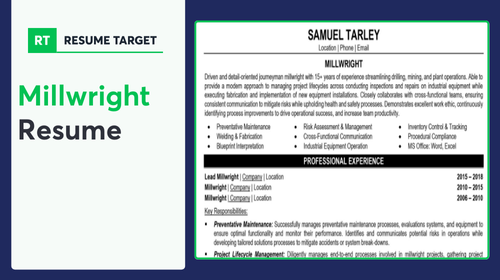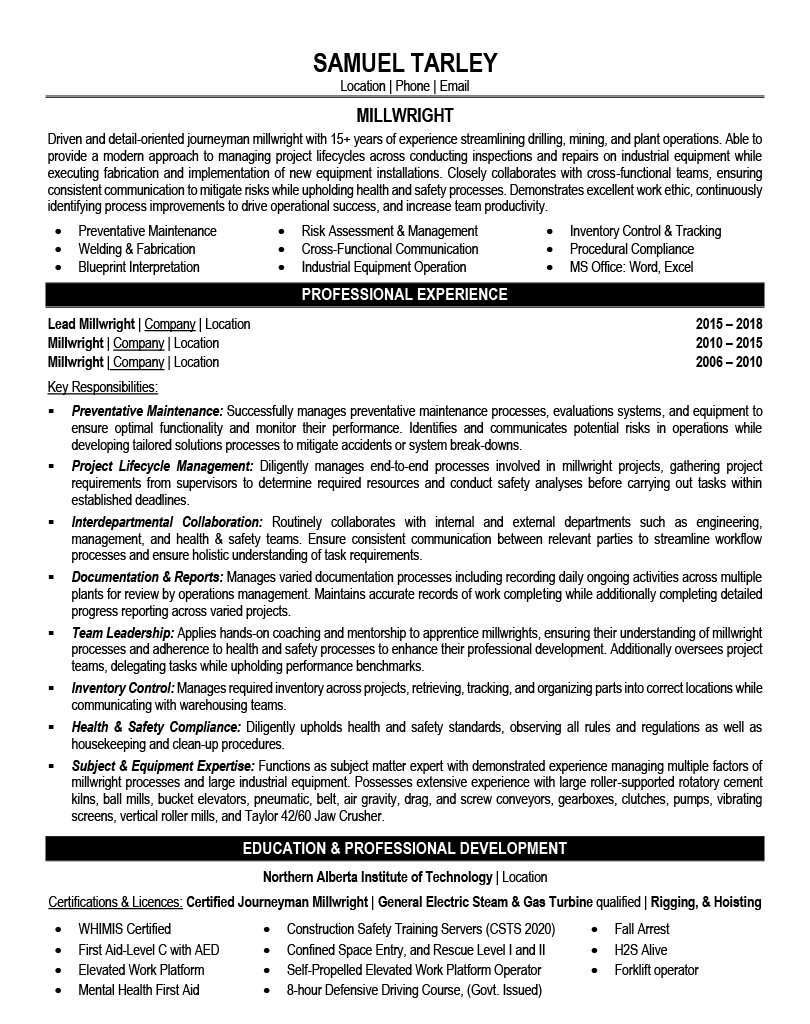

Traffic flow analysis and infrastructure planning are complex, but explaining them on a resume shouldn't be. Many transportation engineers get stuck trying to translate technical projects into compelling achievements.
Are you struggling to showcase your impact beyond basic project descriptions? Your resume needs to bridge the gap between technical expertise and real-world results that matter to employers.
Resume Target specializes in helping transportation engineers transform complex project data into clear success stories. We'll help you create a resume that speaks to both technical reviewers and hiring managers while highlighting your contributions to safer, more efficient transportation systems.

At the intersection of civil engineering and urban mobility, Transportation Engineers shape how millions of people move through their communities by designing and optimizing transportation systems that range from highways and railways to bike lanes and pedestrian walkways.
Your role as a Transportation Engineer involves analyzing traffic patterns, drafting infrastructure plans, and collaborating with stakeholders to create safe, efficient transportation networks that keep cities moving smoothly while considering environmental impact and community needs.
Whether you're just starting out reviewing traffic flow data or advancing to manage major infrastructure projects, the field of transportation engineering offers diverse opportunities to grow from local projects to regional planning roles, making a lasting impact on how communities connect and thrive.
Let's talk about what's exciting in the Transportation Engineering field - your earning potential grows significantly as you gain experience and expertise in this dynamic career path. From entry-level positions to senior roles, your compensation reflects your growing impact on infrastructure development and transportation solutions.
Figures from: AASHTO Salary Survey
Note: I've included only the three experience levels that were specifically mentioned in the source data. I excluded "Professional"and "Executive/Partner"categories since they weren't provided in the original research.Ready to build your future in transportation engineering? From entry-level designer to chief transportation engineer, your career path offers exciting growth potential with the right mix of education and hands-on experience.
To accelerate your career growth, you'll need to master both technical expertise and leadership capabilities that set you apart from your peers.
- Advanced CAD and modeling software proficiency - Traffic analysis and simulation tools - Infrastructure design and planning - Project management and team leadershipLaunch your transportation engineering career by combining a bachelor's degree in civil engineering with entry-level experience in transportation planning, design software, and infrastructure projects.
To advance in this field, you'll need to develop essential technical abilities like AutoCAD proficiency and civil engineering knowledge, along with strong communication skills.
Requirements from University of Louisville Engineering
From Texas to California, Transportation Engineer roles are booming in states with major infrastructure projects.
Figures from CEE Careers
Struggling to showcase your traffic flow analyses, infrastructure projects, and transportation system designs in a way that catches a hiring manager's attention? This comprehensive, section-by-section guide will help you create a professional transportation engineer resume that effectively highlights your technical expertise and project achievements.
As a transportation engineer, you know how to optimize complex traffic systems, but condensing your professional story into a few powerful lines can feel like navigating rush hour without traffic signals.
While you excel at designing infrastructure solutions and analyzing traffic patterns, translating these technical achievements into compelling resume language that catches a hiring manager's attention requires a different kind of engineering altogether.
How would you characterize your primary focus within transportation engineering (e.g., traffic systems, highway design, public transit, or transportation planning) and the scale of projects you typically handle?
Reason: This helps establish your specialized niche within the broad field of transportation engineering and immediately signals to employers your core expertise area. It also gives context to the scope and complexity of work you're equipped to handle.
What unique combination of technical engineering skills and regulatory compliance knowledge defines your approach to transportation solutions?
Reason: Transportation engineering requires a distinct blend of technical expertise and understanding of various regulations and standards. Highlighting this combination helps differentiate you from other engineers and demonstrates your comprehensive grasp of the field.
How do you typically integrate sustainability and public safety considerations into your transportation engineering approach?
Reason: Modern transportation engineering increasingly emphasizes environmental impact and safety concerns. Addressing these aspects in your summary shows awareness of current industry priorities and demonstrates forward-thinking leadership.
As a transportation engineer, you'll need to showcase both technical expertise in design and analysis alongside practical project management abilities that employers demand.
Your skills section should balance specialized technical competencies like traffic flow analysis and roadway design with essential soft skills such as stakeholder communication and regulatory compliance.
Showcase your transportation engineering expertise by organizing your experience into three powerful sections: a concise role overview that highlights your scope, measurable achievements that demonstrate your impact on traffic flow and safety, and core responsibilities that spotlight your technical and project management capabilities.
Many Transportation Engineers struggle to translate complex technical projects and infrastructure improvements into clear, measurable business value. Transform your technical work into compelling achievements by connecting your engineering solutions to improved safety metrics, reduced congestion rates, and quantifiable cost savings that matter to hiring managers.
Transportation Engineers need to showcase how they improve traffic flow, design infrastructure, and enhance public safety through their work. Your responsibilities section should translate technical achievements into clear business impacts that demonstrate your value to transportation departments and consulting firms.
Your education and professional certifications are crucial proof points of your expertise in transportation system design and traffic analysis. Lead with your highest engineering degree and most relevant professional certifications, especially those focused on traffic safety standards and infrastructure planning.
Now that you've built a strong foundation using Resume Target's proven resume writing guidelines, you're ready to transform your base resume into a powerful job-landing tool.
While many transportation engineers make the mistake of using the same resume for every application, successful candidates know that personalizing their resume for each position is just as crucial as customizing their cover letter.
By strategically incorporating specific transportation engineering keywords, technical skills, and project experiences that match each job description, your resume will not only sail through ATS screening systems but will also immediately show hiring managers you're the ideal candidate they've been searching for.
Ready to turn your resume into your secret weapon? Let's make every word count and show employers you're the transportation engineer they need to hire!
Don't let a lack of professional experience stop you from pursuing your dream role as a Transportation Engineer!
Your academic background in engineering, combined with technical skills and any transportation-related projects or internships, can create a compelling story for employers.
Focus on highlighting your engineering coursework, technical software proficiency, and any design projects or internships that demonstrate your understanding of transportation systems.
For more detailed guidance on structuring your resume, check out the Student Resume Writing Guide to ensure you're showcasing your potential effectively.
Your resume summary is your chance to showcase how your engineering education, project work, and technical skills align perfectly with transportation engineering roles.
Focus on highlighting your understanding of transportation systems, any relevant software proficiencies, and design projects that demonstrate your readiness to contribute from day one.
"Detail-oriented and technically skilled Transportation Engineer with comprehensive academic training and internship experience in traffic flow analysis and transportation system design. Proficient in AutoCAD Civil 3D, GIS, and traffic simulation software, with successful completion of three major infrastructure design projects. Demonstrated strong analytical abilities through development of innovative traffic solutions during university capstone project. Seeking to leverage strong technical foundation and passion for sustainable transportation to contribute to urban mobility improvements."
Now's your chance to showcase the specialized knowledge and technical training that makes you a qualified transportation engineer - don't just list your degree and move on!
Transform your academic experience into compelling content by highlighting relevant coursework like "Traffic Flow Theory"or "Transportation Systems Design,"plus any capstone projects where you analyzed real traffic patterns or proposed infrastructure solutions.
The common courses for a Transportation Engineer degree/certification are listed below.Relevant Coursework: Transportation Systems Analysis | Traffic Flow Theory | Highway Design and Safety | Urban Planning | Transportation Infrastructure | Geographic Information Systems
Key Projects:
Urban Corridor Optimization Study: Developed comprehensive traffic flow analysis and improvement recommendations for a high-congestion urban corridor serving 50,000 daily commuters.
Multi-Modal Transit Hub Design: Collaborated with a four-person team to design an integrated transportation center connecting bus, light rail, and bicycle infrastructure.
Leverage your academic training, internship experiences, and technical certifications by showcasing the specialized skills you've developed through coursework, projects, and hands-on learning in transportation engineering.
As an entry-level Transportation Engineer, your combination of technical knowledge and analytical capabilities positions you well for a growing field that continues to evolve with smart city initiatives and sustainable transportation solutions.
When you're immersed in traffic flow analyses and infrastructure planning day after day, it can feel impossible to translate your technical achievements into language that resonates with both hiring managers and ATS systems.
At Resume Target, we specialize in crafting resumes for transportation engineers that highlight both technical expertise and real-world impact, having helped countless professionals showcase projects from urban mobility solutions to sustainable transit designs.
Our deep understanding of the transportation sector means we know exactly how to position your skills for maximum impact.
With major infrastructure projects and smart city initiatives creating unprecedented opportunities in the transportation sector, now is the perfect time to transform your resume into a powerful career tool - schedule your free consultation today.